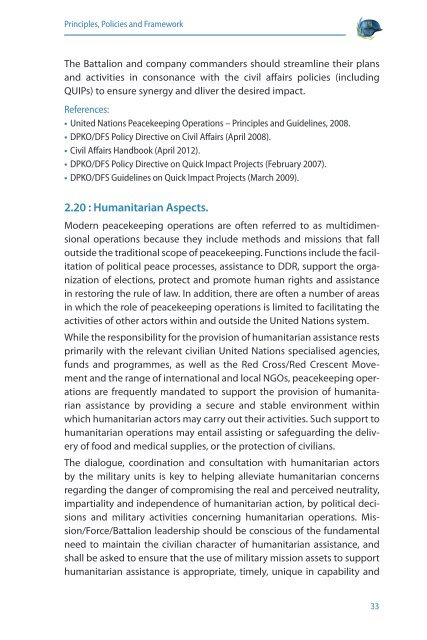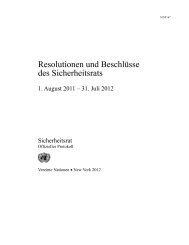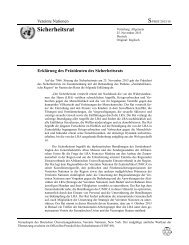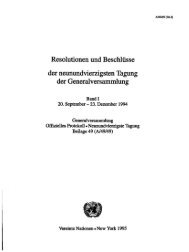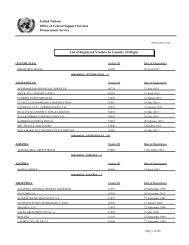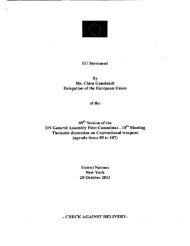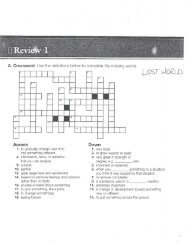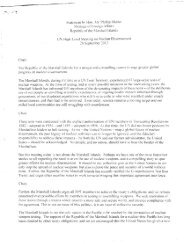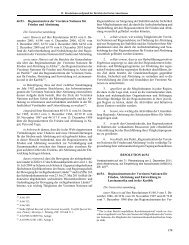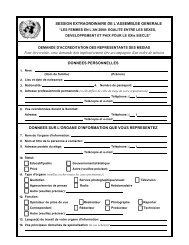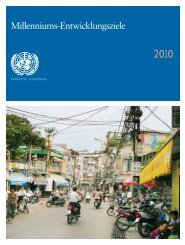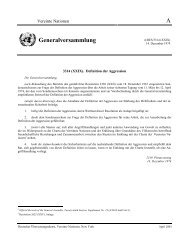United Nations Infantry Battalion Manual - the United Nations
United Nations Infantry Battalion Manual - the United Nations
United Nations Infantry Battalion Manual - the United Nations
Create successful ePaper yourself
Turn your PDF publications into a flip-book with our unique Google optimized e-Paper software.
principles, policies and framework<br />
The <strong>Battalion</strong> and company commanders should streamline <strong>the</strong>ir plans<br />
and activities in consonance with <strong>the</strong> civil affairs policies (including<br />
QUIPs) to ensure synergy and dliver <strong>the</strong> desired impact.<br />
references:<br />
• united nations peacekeeping operations – principles and guidelines, 2008.<br />
• Dpko/Dfs policy Directive on civil affairs (april 2008).<br />
• civil affairs Handbook (april 2012).<br />
• Dpko/Dfs policy Directive on Quick impact projects (february 2007).<br />
• Dpko/Dfs guidelines on Quick impact projects (march 2009).<br />
2.20 : Humanita ri an Aspects.<br />
Modern peacekeeping operations are often referred to as multidimensional<br />
operations because <strong>the</strong>y include methods and missions that fall<br />
outside <strong>the</strong> traditional scope of peacekeeping. Functions include <strong>the</strong> facilitation<br />
of political peace processes, assistance to DDR, support <strong>the</strong> organization<br />
of elections, protect and promote human rights and assistance<br />
in restoring <strong>the</strong> rule of law. In addition, <strong>the</strong>re are often a number of areas<br />
in which <strong>the</strong> role of peacekeeping operations is limited to facilitating <strong>the</strong><br />
activities of o<strong>the</strong>r actors within and outside <strong>the</strong> <strong>United</strong> <strong>Nations</strong> system.<br />
While <strong>the</strong> responsibility for <strong>the</strong> provision of humanita ri an assistance rests<br />
primarily with <strong>the</strong> relevant civilian <strong>United</strong> <strong>Nations</strong> specialised agencies,<br />
funds and programmes, as well as <strong>the</strong> Red Cross/Red Crescent Movement<br />
and <strong>the</strong> range of international and local NGOs, peacekeeping operations<br />
are frequently mandated to support <strong>the</strong> provision of humanitari<br />
an assistance by providing a secure and stable environment within<br />
which humanita ri an actors may carry out <strong>the</strong>ir activities. Such support to<br />
humanita ri an operations may entail assisting or safeguarding <strong>the</strong> delivery<br />
of food and medical supplies, or <strong>the</strong> protection of civilians.<br />
The dialogue, coordination and consultation with humanita ri an actors<br />
by <strong>the</strong> military units is key to helping alleviate humanita ri an concerns<br />
regarding <strong>the</strong> danger of compromising <strong>the</strong> real and perceived neutrality,<br />
impartiality and independence of humanita ri an action, by political decisions<br />
and military activities concerning humanita ri an operations. Mission/Force/<strong>Battalion</strong><br />
leadership should be conscious of <strong>the</strong> fundamental<br />
need to maintain <strong>the</strong> civilian character of humanita ri an assistance, and<br />
shall be asked to ensure that <strong>the</strong> use of military mission assets to support<br />
humanita ri an assistance is appropriate, timely, unique in capability and<br />
33


